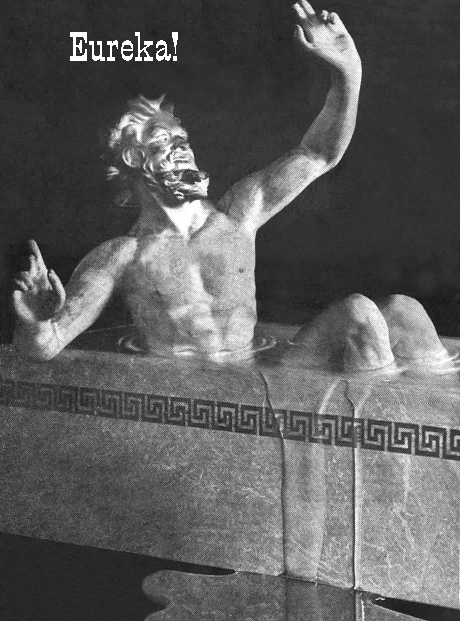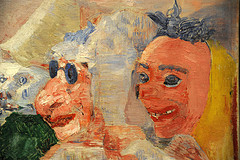

|
For Presence Awaken to the mystery of being here
May you experience each day as a sacred gift woven ~ John O’Donohue (read the entire poem) |
1 December 2011 |
|
Cold fusion How can we know what is true? On the one hand, it is easy for scientists to deceive themselves. On the other hand, there are lots of people and organizations who stand to lose mightily of cold fusion makes it into the energy marketplace, and might be motivated to suppress research and even news reports. The first reports of fusion energy without enormous temperatures and pressures came from two Utah electrochemists in 1989. Deuterium—heavy hydrogen from heavy water—was found to combine, producing helium, heat, and energetic neutrons that could be detected in a Geiger counter. This is not physically impossible, but is highly unlikely, given what we think we understand about nuclear chemistry. Deuterium is the fuel of choice for hydrogen bombs, and two deuterium atoms can be fused to form helium plus a great deal of energy. But getting the two atoms close enough to fuse requires that they be hurtling toward each other fast enough to overcome the repulsion of two positive charges. Hence the enormous temperatures. But quantum mechanics is strange, and sometimes small particles are found to do unexpected things. There is a whole science of ‘tunneling’ that describes particles finding each other even though they didn’t have enough energy to reach each other. Theory predicts it shouldn’t work for typical cold fusion experiments. It has been 22 years, and many experimenters claim that they have been unable to reproduce the positive results with cold fusion. Meanwhile, there are other laboratories that claim they have succeeded, and some have even made public demonstrations of the reliability of the process. Italian Physicist Andrea Rossi claims he has a device that fuses not deuterium but nickel, adding a proton to make copper. He says he is ready to manufacture a production model. Watch and listen to a brilliant, if eccentric Nobel laureate in physics talk about it, Here’s an article from Wired magazine, describing Rossi’s successful public demonstration in October. Is this a grand mistake? Or a hoax? or are we on the verge of a new era of cheap, pollution-free energy? We’ll know soon. If Rossi (and other scientists) are doing what they claim, this is an embarrassment for the scientific establishment, which has remained closed-minded, largely on theoretical grounds, and continues to invest billions in experiments with giant fusion machines, but has denied modest funding for cold fusion work. Then again, sometimes the scientific establishment turns out to be right. |
2 December 2011
|
|
History is on our side “We are the American people. Our dream of freedom and prosperity is too big to fail.” |
3 December 2011
|
|
The Four Noble Truths Martin Seligman has recently determined from historical records that the Buddha suffered from depression, probably due to insufficient physical activity. The following is a reconstruction of what he might have written had his endorphin level not been impaired:
— JJM |
4 December 2011
|
|
“Would the gardener have planted the seed were it not for love of the flower?”* The measure of your greatness is the measure of your magnanimity, your willingness to carry people in your heart. If we are encapsulated in our self-image, we are puny. A great being has stature, something cosmic comes through. Think of people who have really dedicated themselves to service. If we’re great enough, then we have room in our heart even for a person who has hurt us. So we can counter resentment, which can degenerate into hate, then to cruelty and even to war. As a dervish would say: “Shake yourself awake! You have been invited to the divine banquet! Don’t you realize that the divine being is present in you?” The whole of creation is an act of magnanimity. God descended from the solitude of unknowing out of love for the possibility of you. *Rumi |
5 December 2011
|
|
Sometimes it pays to be honest About a year ago, a homeless man in Arizona found a bag full of cash and made a fateful decision: He returned it. 49-year-old Dave Tally of Tempe ... was in debt, unemployed and had lost his driver’s license for DUI violations. Homeless, he was sleeping on a mat in a church-based homeless shelter when he found $3,300 in a backpack at a local light-rail station. That could have gotten Tally out of his hole, but he decided that was the wrong thing to do. Instead, he tracked down the owner of the cash, a college kid named Bryan Berlanger who had planned to use the money to buy a car to replace one he’d lost in an accident. When word got out that Tally had turned in the cash instead of keeping it, the national media came looking for him. Donations poured in, and Tally suddenly found himself with $10,000. But he was determined not to fritter it away. He began paying off his bills, clearing up his driving record, and taking the long road back. He even moved into a no-frills apartment across from the shelter as "a reminder of where I’ve been and where I’m not going back again." One year later, Tally has landed his “dream job,” managing a community garden. Recently ... Tally started overseeing an internship program that allows people who are homeless to volunteer in the garden. But he doesn’t preach to anyone. “I let them know that when they’re ready to make changes, it’s possible,” he says. |
6 December 2011
|
|
At Edge.org, Nicholas Humphrey meditates on the power of the placebo effect, and speculates that there are other ways in which social context influences the mind, whichinfluences our wellbeing. How to harness this process to improve ourselves? First, let's just understand the process, says Humphrey. We should see the placebo effect as part of a much larger picture of homeostasis and bodily self-control. But now I’m ready to expand on this much further still. If this is the way humans and animals manage their physical health, there must surely be a similar story to be told about mental health. And if mental health, then—at least with humans—it should apply to personality and character as well. So I’ve come round to the idea that humans have in fact evolved a full-blown self management system, with the job of managing all their psychological resources put together, so as to optimise the persona they present to the world. Now almost every month’s issue of Psychological Science, for instance, reports some striking new finding about how cues from the surroundings can change people’s nature. Moral judgments, reasoning skills, personal hygiene, political attitudes —you name it—are all proving to be unexpectedly malleable, as people respond to the social and physical weather signals that their brains (if not their conscious minds) pick up on. |
7 December 2011
|
|
Antonin Dvořak worked with heart-rending melodies, made so much deeper and more touching by the rich complexity of his arrangements. Listen to the Adagio from his piano trio in Fm, Op 65. Some of the counter-rhythms in the piano register only subliminally, but keep the music interesting as we listen again and again. |
8 December 2011
|
|
Team Marine This is the story of an empowered group of high school students in Santa Monica, CA who launched a local campaign to change some adult behaviors in order to protect fish, turtles and sea birds. They targeted plastic bag consumption because it is so thoughtless, so easily changed, and the results were readily visible locally. Young people help us open our eyes to things we have stopped seeing. watch a short film by Lynne Cherry |
9 December 2011
|
|
Mercy The quality of mercy is not strain’d, — WS (Merchant of Venice) |
10 December 2011
|
|
A question only you can answer There is a New Age half-truth which has lost its power with repetition, that we each create our own reality. Absolutely true, and almost as radical, is that we choose our own values, constructed from social messages, hormones, sensations of pleasure and pain, with only a bit of discipline imposed by logical consistency. We have the absolute power to choose another frame of reference, to pursue and to value something different, to change what we regard as good and desirable, for ourselves and for our world. ...but should we? — Josh Mitteldorf |
11 December 2011
|
|
Trapping magnetic field lines Because a superconductor has no resistance to electric current, it effortlessly creates counter-currents to oppose any magnet in its vicinity. This has the effect of keeping magnetic fields out, and creating a countervailing magnetic field that repels the applied field. A superconductor with defects allows some magnetic field lines to penetrate within, whereupon they become ‘trapped’ and cannot move. A ring of superconductor can become locked onto a magnet, and resists being pulled away as well as being pushed toward the magnet. It sounds too abstract to have any practical interest. But take a look at this video, which makes you dream of levitating cars and trains, if not Mr Wizard. A generation ago, the only known superconductors had to be cooled to within a few degrees of absolute zero, requiring lab-grade refrigeration and liquid helium. Now we have ‘high temperature’ superconductors, which means they remain superconducting at temperatures past the boiling point of liquid nitrogen, which is cheap and common. Still, if you try to imagine cooling a thousand miles of railroad tracks with liquid nitrogen, the cost mounts. The search is on for room-temperature superconductors. |
12 December 2011
|
|
Plus ça change.. William Drummond of Hawthornden, born this day in 1585, writes about the distractions and baubles that man seems to prefer to the depth of Natural wonders. It’s easy to see that we have better distractions than Dummond had, but it’s also true that we have better access to a broad range of natural environments. The Book of the World f this fair volume which we ‘World’ do name, |
13 December 2011 |
|
Just trust me...I’m a scientist. Last week’s Science Magazine has a cover story about a crisis of science grown ‘too big to fail’. One of the cornerstones of the scientific method is that scientists are supposed to be able to repeat experiments and check each others’ work. But more and more science is being done at the edge of what is affordable and what is technically possible. More and more of what is reported is, in fact, never checked. The
Large Hadron Collider at CERN announced ‘tantalizing hints’ of
the Higgs boson. The facility cost $5 billion, and is capable of
uniquely high energies. Who’s going to keep them honest? The
Webb Telescope, NASA’s proposed
successor to the Hubble Space Telescope, is now projected to cost $7
billion. A
Livermore research facility that seeks to control fusion with huge
lasers will cost tens of billions. It’s not just physics. Large epidemiological studies monitor hundreds of thousands of people, and are very expensive to administer. Studies involving monkeys and chimps are limited by their availability and costs of housing them, and by ethical concerns. You don’t have to be paranoid, thinking that scientists are all dishonest to believe this is a problem. Everyone who believes in his research is subject to subconscious biases. Richard Feynman said, “The first principle is that you must not fool yourself and you are the easiest one to fool.” It’s still true that some of the best science is done with a lot of creative thinking rather than with a lot of expensive equipment. NSF has acknowledged this, and just recently has announced a fast track approval process for small, out-of-the-box research proposals. |
14 December 2011
|
|
The Bodhisattva Vow Sentient beings are numberless; Delusions are endless; The gates of the Dharma are many; The Buddha’s way is unsurpassed; |
15 December 2011
|
|
Boston Tea Party, as told by a participant Thom Hartmann has unearthed a book written by one of the crew (17 y.o. at the time) who threw tea into Boston Harbor on the 16th of December, 1773. Hartmann tells us this was not about the tea tax—not about ‘taxation without representation’—but in fact was a revolt against monopoly capitalism. The East India Company had been granted by the British Crown exclusive rights to trade in not just tea, but food as well. They had created artificial shortages that had starved 1½ million people in East Asia, and the American Colonists were afraid that they would be the next victims of price gouging. In the book by George Robert Twelvetrees Hewes, the story is told that the captain of the ship willingly surrendered keys to the hold where the tea was kept, and that British soldiers from ships docked nearby stood by and took no action against the rebel crowd. Listen to
Hartmann recount from the 1834 book, A Retrospect of the Boston Tea
Party. |
16 December 2011
|
|
Communal interdependence that is built into language Alexandra Fuller writes of the East African community where she grew up, and of the Shona language she learned as a child: There is, for example, a reciprocation in Shona greetings that does not exist in English: ‘Maswera sei?’ (How did you pass the day?) is generously answered thus: ‘Taswera kana maswerawo’ (I passed the day well if you passed the day well). To which the original greeter replies, ‘Taswera hedu.’ (I passed the day well, indeed. The wellbeing of an individual depends on the wellbeing of others—I’m OK if you’re OK. — from Harpers Magazine, Jan 2012 |
17 December 2011
|
|
Toward freedom from fear Fear of death has its origins in a primal, hormonal response that has been programmed by natural selection. The thought of death has been made intensely unpleasant to insure an aversion that has helped our forebears to compete intensely and has contributed to their evolutionary success. Our brains construct reasons for our emotions. Social humans have rationalized this animal instinct with intellectualizations about the void, about infinity, about the sacred value of the individual soul. On the other side, we rationalize the avoidance of fear by attaching value to death, or averring its logical necessity: ‘death gives meaning to life’ or ‘death puts life in perspective’. The sting in the fear of death is this hormonal rush of terror. Hormonal fear blurs our thought and distorts our perception. We can decondition ourselves to that wide-eyed numbness, and this is the beginning of a fair appraisal and clear understanding of ourselves in relation to death. — Josh Mitteldorf |
18 December 2011
|
|
Celebrated subversive «Il faut rêver très longtemps pour vivre avec grandeur, et le rêve n’est soigné que dans l’obscurité.»‘’
“A man must dream a long time before he can act with grandeur, and
dreams can only be nursed in darkness.” Genet was born this day in 1910, bastard son of a Parisian prostitute. He had no stable home, and wound up in children’s prison for the last years of his childhood. ‘Throughout his five early novels, Genet works to subvert the traditional set of moral values of his assumed readership. He celebrates a beauty in evil...’ (Wikipedia) |
19 December 2011
|
|
Vaclav Havel, 1936-2011 He reminds us of the unreasonable effectiveness of non-violent civil disobedience. He persisted through years of Soviet-dominated police state, and helped in a transition to self-rule that was remarkably free of rancor. Read
Vaclav Havel and the Existential Revolution ‘Truth and love must prevail over lies and hatred.’ |
20 December 2011
|
|
The Onset Always the same, when on a fated night Yet all the precedent is on my side: — Robert Frost |
21 December 2011
|
|
Thinking about thinking Many people believe that ‘thinking’ is basically the same as ‘reasoning.’ But when you stop work for a moment, look out the window and let your mind wander, you are still thinking. Your mind is still at work. This sort of free-association is an important part of human thought. No computer will be able to think like a man unless it can free-associate. Many people believe that reality is one thing and your thoughts are something else. Reality is on the outside; the mental landscape created by your thoughts is inside your head, within your mind. Yet we each hallucinate every day, when we fall asleep and dream. And when you hallucinate, your own mind redefines reality for you; ‘real’ reality, outside reality, disappears. No computer will be able to think like a man unless it can hallucinate. Many people believe that the thinker and the thought are separate. For many people, ‘thinking’ means (in effect) viewing a stream of thoughts as if it were a PowerPoint presentation: the thinker watches the stream of his thoughts. This idea is important to artificial intelligence and the computationalist view of the mind. If the thinker and his thought-stream are separate, we can replace the human thinker by a computer thinker without stopping the show. The man tiptoes out of the theater. The computer slips into the empty seat. The PowerPoint presentation continues. But when a person is dreaming, hallucinating — when he is inside a mind-made fantasy landscape — the thinker and his thought-stream are not separate. They are blended together. The thinker inhabits his thoughts. No computer will be able to think like a man unless it, too, can inhabit its thoughts; can disappear into its own mind. What does this mean for the internet: will the internet ever think? Will an individual computer ever think? We need to see, first, that in approaching the topic of human thought, we usually stop half-way through. In fact, the human mind moves back and forth along a spectrum defined by ordinary logic at one end and ‘dream logic’ at the other. ‘Dream logic’ makes just as much sense as ordinary ‘day logic’; it simply follows different rules. But most philosophers and cognitive scientists see only day logic and ignore dream logic — which is like imagining the earth with a north pole but no south pole. |
22 December 2011
|
|
Fiscal alternatives The United States is not broke—and we should laugh at the delusion that we are. The potential for abundance is everywhere around us, but it stagnates for sheer lack of credit. We have contracted our nation’s power to produce and consume just to prove that we can live within our means. And that’s a formula for economic ruin. There are some (the economic historian Niall Ferguson, for instance) who think we ought to sell our public assets, like our interstate highways, to increase our nation’s stock of hard currency. That’s preposterous. There’s a better course of action once our citizens and leaders understand what money is, once they understand that hard currency—the Federal Reserve Note, for instance—is just a representation of a force that has been summoned by bankers out of nothing. We can summon it ourselves, and use the great power of the Federal Reserve—in partnership with Congress—to preempt the threat of inflation. Why shouldn’t the American people have additional funds to be used for such impeccable purposes as infrastructure maintenance, public safety, environmental protection, and energy research to counteract global climate change—funds created by the government without more taxes or debt? Does the principle seem too good to be true—a mere mirage, something for nothing? Think it over, for the system that we have right now is an exercise of mind over matter. The system I propose would give the people and their leaders an equal share in money creation with the bankers who are seeking private profit. It’s a profitable game, the creation of money, and we need more players at the table. — read the rest of Richard Striner’s article in The American Scholar |
23 December 2011
|
|
What if they gave a war and nobody came? Christmas, 1914, British and German ground troops went over the heads of their Generals to create their own truce. This is a quote from a letter one of the soldiers wrote to his mother, cited in a review by John Denson of Stanley Weintraub’s book, called Silent Night. “Lieutenant Geoffrey Heinekey, new to the 2nd Queen’s Westminster Rifles, wrote to his mother, ‘A most extraordinary thing happened. . . Some Germans came out and held up their hands and began to take in some of their wounded and so we ourselves immediately got out of our trenches and began bringing in our wounded also. The Germans then beckoned to us and a lot of us went over and talked to them and they helped us to bury our dead. This lasted the whole morning and I talked to several of them and I must say they seemed extraordinarily fine men . . . . It seemed too ironical for words. There, the night before we had been having a terrific battle and the morning after, there we were smoking their cigarettes and they smoking ours.” (p. 5) As night fell on Christmas Eve the British soldiers noticed the Germans putting up small Christmas trees along with candles at the top of their trenches and many began to shout in English "We no shoot if you no shoot."(p. 25). The firing stopped along the many miles of the trenches and the British began to notice that the Germans were coming out of the trenches toward the British who responded by coming out to meet them. They mixed and mingled in No Man’s Land and soon began to exchange chocolates for cigars and various newspaper accounts of the war which contained the propaganda from their respective homelands. Many of the officers on each side attempted to prevent the event from occurring but the soldiers ignored the risk of a court-martial or of being shot. — from John Denson’s review |
24 December 2011
|
|
Uncle Samuel “You are bold, Uncle Samuel,” the young man said, — Jessie Wallace Hughan, activist for peace and social justice |
25 December 2011
|























